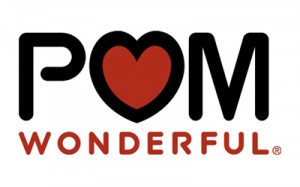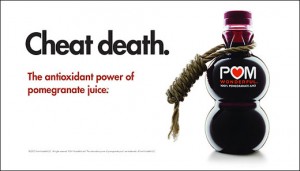Is any claim to health benefits too good to be true?
 In recent news, the Federal Trade Commission (FTC) has upheld the decision that POM Wonderful has been using deceptive advertising in their marketing strategies. POM wonderful, whose products focus on the benefits of pomegranates, claimed that their product could help fight Alzheimer’s disease, arthritis and prostate cancer. POM supposedly spent $35 million in research to substantiate its health claims but the vigor and process did not meet FTC standards. After this two year long standing battle, they still reject the claims to misleading advertisements.
In recent news, the Federal Trade Commission (FTC) has upheld the decision that POM Wonderful has been using deceptive advertising in their marketing strategies. POM wonderful, whose products focus on the benefits of pomegranates, claimed that their product could help fight Alzheimer’s disease, arthritis and prostate cancer. POM supposedly spent $35 million in research to substantiate its health claims but the vigor and process did not meet FTC standards. After this two year long standing battle, they still reject the claims to misleading advertisements.
With the increase in health conscious individuals worried about rising rates of obesity and heart disease, it is easy for consumers to fall prey to misleading advertisements. The growing trend of products ‘high in antioxidants’ that help prevent cancer, maintain blood pressure or cholesterol levels, easily created the opportunity for companies, such as POM, to ride this wave.
The issue for customers becomes when is a company allowed to make any claims of health benefits? It was ruled in this case that POM could not make any health claims unless “scientists had performed two randomized human trials.” I question if this is even sufficient to make such broad health claims since inevitably, there are huge differences in people based on factors of age, weight, ethnicity, etc. On the flip slide, one can argue that instead these limitations imposed by the FTC are too expensive and time consuming for food manufacturers who want to promote their developments of their products. Where do we draw the line for what is acceptable? If no specific health claims can be made, a product that advertises ‘health-promoting characteristics’ does far less to attract individuals than one that “minimizes the risk of heart disease.” In my opinion, POM went too far to say that their products ‘cheat death’ and help fight against diseases. Their advertisement creates an impression where customers might think ‘I drank POM juice today instead of having my coffee, that means I don’t need to go exercise!’ People may not necessarily fully believe in these false ads, but needless to say it is often the easy way out in tricking ourselves in believing we are living healthy lifestyles. Ultimately, it is up to the customers to choose what they want to believe is reasonable.
http://www.redorbit.com/news/health/1112766103/ftc-supports-pom-false-advertising-claims-011713/



I completely agree! “Cheat death” is definitely too far.
Yeah I totally agree with you. Nowadays, there are so many products being advertised as healthy and disease-preventing. Yet, how many of these have actually been tesitified and certified? As a layperson in food science facing so many fancy advertisements, i am cringed at the thought of picking any.